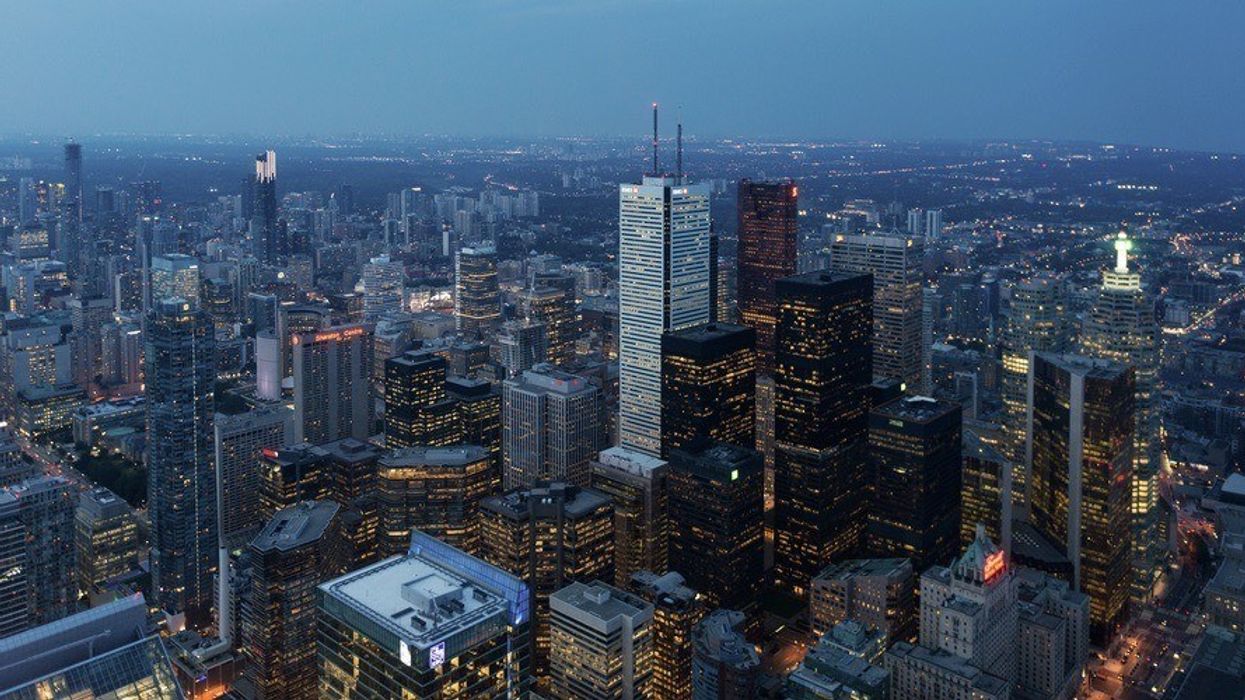While residential real estate has broken records amid the pandemic, commercial real estate has been a different story, with office vacancy rates climbing across the country, and downtown Toronto's vacancy rate rising to over 7% in the fourth quarter of 2020.
Downtown Toronto saw office vacancy climb 4.7%, or 250 bps (basis points), quarter-over-quarter to reach 7.2% in Q4, according to the latest report from commercial real estate firm CBRE.
The report also revealed that the national office vacancy rate hit 13.4%, a high last hit in 2004, while industrial availability fell to 3.3% as 23.1 million sq. ft. of new space was constructed throughout the year and quickly leased.
The shift comes amid months of remote work, which has resulted in employers rethinking the future of the office and that has prompted some of them to give up their office space.
According to the latest data, in the fourth quarter of 2020, the 2.6 million sq. ft. of sublet space currently on the market in downtown Toronto represents almost half (40.4%) of all vacant space, an all-time high.
What's more, Toronto's suburban vacancy rate rose for a third consecutive quarter to 15.3%, marking the highest suburban vacancy rate in Canada's largest city since 2004.
READ: Downtown Toronto’s Commercial Real Estate Scene is Waking Up. Now What?"
"Commercial real estate is a study of contrasts right now, but trajectory isn’t everything," says CBRE Canada Vice Chairman Paul Morassutti. "The office market isn’t as bad as the industrial market is good and it’s important to dig into the numbers."
According to the Q4-2020 report, office attendance and leasing remains hindered by rolling lockdowns. Canada’s downtown office vacancy rate rose to 13.0% in the fourth quarter, compared to 9.8% a year earlier. Both direct and sublet space increased in nearly equal measure this quarter.
Outside of Toronto, Vancouver had its downtown vacancy rise to 5.8%, while Montreal (10.2%), Calgary (29.5%), Edmonton (20.1%), and Ottawa (9.5%) also saw downtown office vacancy rates rise in Q4.
"We're seeing larger, well-capitalized tenants wait for the vaccine to resume operations, while smaller businesses have had to adjust their office commitments in order to meet current challenges," says Morassutti. "
Without question, there is hardship behind the numbers, but it’s also worth noting that our downtown office markets are moving in a more balanced direction for the first time in a decade. It’s neither a tenant nor landlord market and this is where the best conversations can happen."
Meanwhile, Canada’s major industrial real estate markets continue to benefit from unrelenting demand for space amid a surge in e-commerce and logistics activity. This resulted in the drawdown of 10.4 million sq. ft. of industrial space nationwide, well above the quarterly five-year average of 6.0 million sq. ft.
"Developers remain bullish on the industrial market, with an additional 26.8 million sq. ft. under construction nationwide," reads the report.
Locally, the industrial availability rate held steady at 2% for the third consecutive quarter, despite 12.1 million sq. ft. of new supply in 2020, the largest recorded amount of new construction in a single year.
On the other hand, Vancouver’s industrial availability rate fell to 2.3%, down from 2.8% in Q3. Montreal has the lowest industrial availability rate in that city’s history, at 2.1%.
CBRE noted that smaller cities are now benefiting from these trends. Halifax reported a record-high 449,000 sq. ft. drawdown of industrial space in Q4, bringing that city’s year-end absorption total to a 13-year high of 569,000 sq. ft.
"We can’t build industrial space fast enough," says Morassutti. "There’s a huge amount of new space being built, but until then, industrial users will need to be creative to keep up with customer demand, including optimizing existing facilities and converting older industrial space."
As for what's to come, Amazon recently took on an additional 100,000 square feet of office space in two buildings in the south part of Toronto’s financial district: 18 York Street and 120 Bremner Boulevard — which are located in the Southcore Financial Centre -- signalling that there are still major companies looking to return to the office, though not immediately.
Amazon confirmed to Toronto storeys the company has now leased three new floors at 18 York Street and two new floors at 120 Bremner Boulevard and with occupancy of the new spaces is slated for 2022.





















